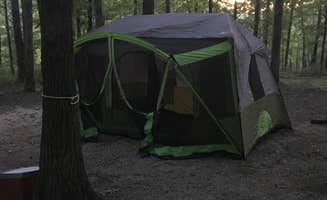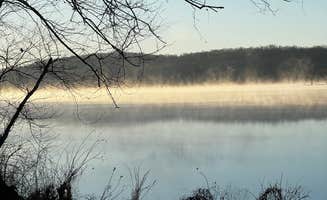Meriwether Lewis Campground
When you think FREE you probably don't think of sites THIS NICE!
For My FULL VIDEO Of My Experience At This Campground CLICK HERE
Following the winding a scenic Natchez Trace you begin to climb higher and higher into the beauty of the mountains. When I was making this trip in late August, I could already see the shifting of the leave in its most early stages and I could only imagine what it would be like only a month later.
As I entered the park and followed the signs toward the campground I was very eager to see what this FREE site had to offer. I had discovered this site when searching youtube for things to do and someone suggested camping here because of the historic landmark in the park. After further research I discovered it was a pretty decently sized campground with semi primitive camping.
I arrived at the camping loops and discovered two loops of camping each with differing sizes of spaces, some designed for pull through style RV parking and some for back in car parking. Spaces were large and while there were several people staying here it did not seem overly crowded.
The first loop was much further from the restroom than the second, which also housed the campground host in his RV just as you entered the loop. He was welcoming with a smile and wave and I just felt like this was going to be a nice place to stay for the night.
You can stay for up to 14 days at this location and I could easily see this being one of those stops you wouldn’t necessarily want to leave in a hurry because it was so peaceful. There were numerous hiking trails and a well landscaped creek area which made for a great place to come for day use as well.
My site was pretty typical in that it had a fire ring and picnic table. The ground was semi level and very rough so camping in a tent I was happy to have brought a little padding. The restrooms were very nice and had both flush toilets and drinking water. They were well lit and for a minute when I walked in I wondered how on earth this was a free site because they were so nice.
All was great until about 8 p.m. when some people pulled in after dark and weren’t quite sure how to set up their tent and were pretty loudly disagreeing with one another in debate of how to do so. But after they finally figured that out about an hour later the night was again left to the sounds of the cicadas and frogs.
TIPS
- If you are tent camping bring some kind of cushion on pad for your floor otherwise it will be a rough evening on the ground.
- Bug spray is a must, the mosquitoes are thick here because of all the moisture of the forest and ticks can also be a problem during certain months.
- Don’t tell all your friends, they will take over your secret little camping spot after they find out just how amazing this site really is!! (lol)



